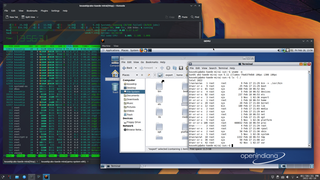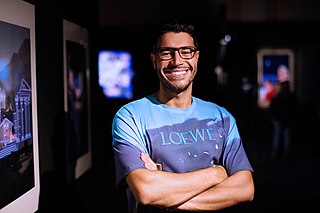
Red Hat, Inc. is an American software company that provides open source software products to enterprises and is a subsidiary of IBM. Founded in 1993, Red Hat has its corporate headquarters in Raleigh, North Carolina, with other offices worldwide.

Greenwashing, also called green sheen, is a form of advertising or marketing spin that deceptively uses green PR and green marketing to persuade the public that an organization's products, goals, or policies are environmentally friendly. Companies that intentionally adopt greenwashing communication strategies often do so to distance themselves from their environmental lapses or those of their suppliers.

False advertising is the act of publishing, transmitting, distributing, or otherwise publicly circulating an advertisement containing a false claim, or statement, made intentionally to promote the sale of property, goods, or services. A false advertisement can be classified as deceptive if the advertiser deliberately misleads the consumer, rather than making an unintentional mistake. A number of governments use regulations or other laws and methods to limit false advertising.

SUSE S.A. is a German multinational open-source software company that develops and sells Linux products to business customers. Founded in 1992, it was the first company to market Linux for enterprise. It is the developer of SUSE Linux Enterprise and the primary sponsor of the community-supported openSUSE Linux distribution project.
Green brands are those brands that consumers associate with environmental conservation and sustainable business practices.
Veritas Backup Exec is a data protection software product designed for customers with mixed physical and virtual environments, and who are moving to public cloud services. Supported platforms include VMware and Hyper-V virtualization, Windows and Linux operating systems, Amazon S3, Microsoft Azure and Google Cloud Storage, among others. All management and configuration operations are performed with a single user interface. Backup Exec also provides integrated deduplication, replication, and disaster recovery capabilities and helps to manage multiple backup servers or multi-drive tape loaders.
In computing, the term remote desktop refers to a software- or operating system feature that allows a personal computer's desktop environment to be run remotely from one system, while being displayed on a separate client device. Remote desktop applications have varying features. Some allow attaching to an existing user's session and "remote controlling", either displaying the remote control session or blanking the screen. Taking over a desktop remotely is a form of remote administration.
Ericom Software, Inc. is a Closter, New Jersey–based company that provides web isolation and remote application access software to businesses.

In computing, virtualization (v12n) is a series of technologies that allows dividing of physical computing resources into a series of virtual machines, operating systems, processes or containers.
Shavlik Technologies was a privately held company founded in 1993 by Mark Shavlik, who also was one of the original developers of Windows NT in the late 1980s and early 1990s at Microsoft.

libvirt is an open-source API, daemon and management tool for managing platform virtualization. It can be used to manage KVM, Xen, VMware ESXi, QEMU and other virtualization technologies. These APIs are widely used in the orchestration layer of hypervisors in the development of a cloud-based solution.
Daou Technology Inc., Republic of Korea, is a public multinational company that specializes in marketing communication and commerce products and services, applications for enterprise, and IDC including IT consulting service. Daou Technology was founded in 1986 by Kim Ik-Rae while he played a leading role in advancement of database management system and web technology by localizing Informix RDBMS software and Netscape web browser for the first time in 1995.

Cloud Foundry is an open source, multi-cloud application platform as a service (PaaS) governed by the Cloud Foundry Foundation, a 501(c)(6) organization.
Veeam Software is a privately held US-based information technology company owned by Insight Partners. It develops backup, disaster recovery and modern data protection software for virtual, cloud-native, SaaS, Kubernetes and physical workloads. Veeam Software was co-founded by two Russian entrepreneurs, Ratmir Timashev and Andrei Baronov. While Veeam's start was built on protecting data across virtualized workloads, it has significantly expanded to protect data across a wide variety of platforms from AWS, Azure, Google Cloud, Microsoft 365, Kubernetes, etc. Veeam's current CEO, Anand Eswaran, has been pushing Veeam's strategy to accelerate share in the enterprise with adding several layers to Veeam's partnerships. Veeam took over the #1 market share in the data protection category in the second half of 2022. The company headquarters is in Kirkland, Washington, United States.

Matthieu Suiche, also known as Matt and under the username msuiche, is a French hacker and entrepreneur. He is widely known as the founder of MoonSols and co-founder of CloudVolumes, which was acquired by VMWare in 2014. In March 2014, Suiche was highlighted as one of the 100 key French developers in a report for French minister Fleur Pellerin.
Virtuozzo is a software company that develops virtualization and cloud management software for cloud computing providers, managed services providers and internet hosting service providers. The company's software enables service providers to offer Infrastructure as a service, Container-as-a-Service, Platform as a service, Kubernetes-as-a-Service, WordPress-as-a-Service and other solutions.
UKCloud, also trading as UKCloud Health and UKCloudX, was a British cloud provider, headquartered in Farnborough, United Kingdom. It provided multicloud services to organisations in the UK public sector and other regulated industries. The company was founded in 2011 as Skyscape Cloud Services, rebranding as UKCloud in August 2016. UKCloud, along with its UKCloud Health and UKCloudX divisions, supported the digital workload for organisations such as Genomics England, Ministry of Justice, Capgemini and London Business School.

SAP Converged Cloud is a private managed cloud developed and marketed by SAP.
Bluewashing is a term used to describe deceptive marketing that overstates a company's commitment to responsible social practices. It can be used interchangeably with the term greenwashing but has a greater focus on economic and community factors. Alternatively, it could be phrased in a way that companies hide the social damage that their policies have caused.
AI washing is a deceptive marketing tactic that consists of promoting a product or a service by overstating the role of artificial intelligence (AI) integration in it. It raises concerns regarding transparency, consumer trust in the AI industry, and compliance with security regulations, potentially hampering legitimate advancements in AI. U.S. Securities and Exchange Commission (SEC) chairman Gary Gensler compared it to greenwashing.








